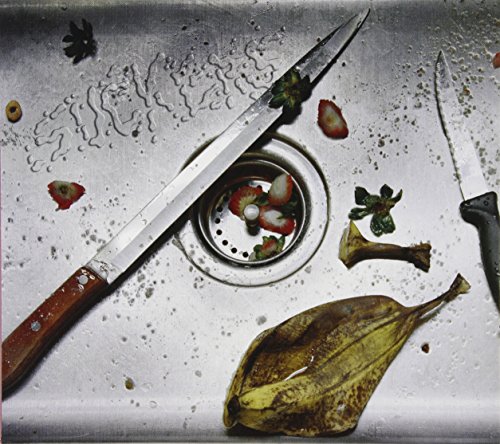
Suckers
Candy Salad
Release Date: Apr 24, 2012
Genre(s): Pop/Rock, Indie Pop
Record label: French Kiss
Music Critic Score
How the Music Critic Score works
Buy Candy Salad from Amazon
Album Review: Candy Salad by Suckers
Fairly Good, Based on 8 Critics
Based on rating 7.5/10
Even if your exposure to Suckers is limited to their self-titled debut EP, or hell, even “It Gets Your Body Movin’,” it doesn’t take much mental gymnastics to know how their sophomore album, Candy Salad sounds (same goes for great 2010 full-length, Wild Smile). Bleary-eyed sing-alongs ready for campfires? Check. Songs that sometimes sound like they’re being sung by the drunkest guys in a bar full of drunks? Check.
Based on rating 7/10
Brooklyn art pop quartet Suckers exploded into critical renown with their untamed 2010 debut, Wild Smile. That record bore similarities to contemporaries of the band like MGMT and Yeasayer, as well as including some pretty discernable lines to the prototypical art-damaged funk of Talking Heads and Modest Mouse's wobbly guitar lines. Follow-up LP Candy Salad loses a lot of the "art" prefixes that were pinned onto Wild Smile, trading up in production values but ultimately losing some of the energy that the album got by on.
Based on rating 3.5/5
In an era where synths and sequencers dominate what’s often labeled as “cool” music, there’s something endearing about a band that sticks to the classic guitar-and-organ formula forged by ‘70s and ‘80s soft rock. Whether ironic or not, Brooklyn quartet Suckers incorporate the “Let’s take a drive in our Camaro” sound of corporate rockers like Boston, Journey, and Styx into their own brand of experimental indie pop. The band’s 2010 debut, Wild Smile, was a bizarre but beguiling exercise in combining those familiar, even cheesy, elements of retro rock (the Brad Delp-ish falsetto of “Before Your Birthday Ends,” for example) with outsiderdom, anxiety, and unassuming lyricism.
Based on rating 6.9/10
For a band like Suckers—one that specializes in pop music as weird as it is weirdly hummable—”maturation” is a dirty word. The Brooklyn trio made their name as art-pop freaks on Wild Smile, their intriguing 2010 debut, marrying psychedelic instrumental flourishes to sticky melodies, all framed within a production style that buzzed with details yet never relented to gloss. But Candy Salad, their sophomore follow-up, is indeed a more “mature” album, at least sonically: Its surfaces are shinier and smoother than Wild Smile’s, easier to imagine blasting out of your speakers as you fine-tune your car radio to a college indie-rock station.
Based on rating 6.7/10
"It's not Chinese braille," Quinn Walker pleads around the midpoint of promising Brooklyn chamber-poppers Suckers' sophomore set, Candy Salad. That little curio, oddly enough, might just be the clearest statement Candy Salad makes amidst its 45 twisting, turning minutes. While puzzling it out, I kept coming back to this line, an indication that, hey, maybe this stuff isn't the hardest to grok.
Based on rating 65%%
SuckersCandy Salad[Frenchkiss; 2012]By Arthur Velez; April 25, 2012Purchase at: Insound (Vinyl) | Amazon (MP3 & CD) | iTunes | MOGTweetDuring the chorus of “Bricks To The Bones,” there exists an awkward moment of nostalgia. As the members of this Brooklyn trio belt out its chorus, “home/ your love is home/ from the bricks to the bones/ your love is all that surrounds me,” it’s tough not to be transported back to a time when indie music was lauded for yelps and floor toms rather than wobbles and smooth flows. Anchored by a wall of delay and reverb, the sprawling third track on Suckers’ latest LP, Candy Salad, is eerily reminiscent of Animal Collective in 2009, and their transcendent jam, “My Girls.
Based on rating C+
Suckers’ second full length finds the Brooklyn trio smoothing out the wrinkles, crafting a heavy power-pop record that sounds more polished, thanks to producer Matt Boynton (who has previously worked with MGMT). His influence resides in reshaping Suckers, leaning here toward a more conventional sound. The question remains to be answered, though, whether overhauling your sound on the second album is a good idea.
Based on rating 5/10
When Suckers released their debut album, Wild Smile, in 2010, it straddled a number of trends that were big in indie-pop at the time: the group was from Brooklyn, there were blips and bubbles of rhythm from other continents, and above all the vocals were sung in falsetto, with a lot of harmonies. Since then, fashions have changed, and Suckers have changed with them: their sophomore album, Candy Salad, relies less on falsetto and uses more straightforward rhythms. Depending on your personal views on falsettos, this might be good or bad.
'Candy Salad'
is available now

